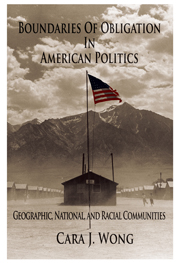Book contents
- Frontmatter
- Contents
- Acknowledgments
- Preface
- Boundaries of Obligation in American Politics
- 1 Community and Special Obligations
- 2 The Boundaries of Imagined Communities
- 3 Imagined Gates and Neighbors
- 4 Restricting National Boundaries
- 5 Blurring the Color Line
- 6 Conclusion
- Appendix
- References
- Index
- Titles in the Series
5 - Blurring the Color Line
Published online by Cambridge University Press: 05 June 2012
- Frontmatter
- Contents
- Acknowledgments
- Preface
- Boundaries of Obligation in American Politics
- 1 Community and Special Obligations
- 2 The Boundaries of Imagined Communities
- 3 Imagined Gates and Neighbors
- 4 Restricting National Boundaries
- 5 Blurring the Color Line
- 6 Conclusion
- Appendix
- References
- Index
- Titles in the Series
Summary
In 1993, Billings, Montana, suffered a rash of hate crimes. Racist graffiti was painted on the home of a Native American family, skinheads threatened the services of an African American church, and a brick was thrown at a Jewish family's home, breaking a window displaying a menorah. In response, residents of Billings (of different races and religions) volunteered to paint over the graffiti, they went to the church's services to show support and provide protection, and thousands placed menorahs in the windows of their homes.
The story of this town is unusual enough that it was made into a documentary film, and it provides a vivid example of how the expanding of community boundaries beyond objective group lines can occur. In Chapter 4, I showed how the shrinking of community boundaries to only “true Americans” leads to attitudes restricting who can enter the country and who should benefit from the rights and opportunities of community membership. The opposite is also possible: an enlarged perception of one's community can prompt greater support for government programs to benefit individuals who are not objective ingroup members.
Race provides a good case for studying the potentially shifting boundaries of community and of obligation (Wong 1999). Researchers may understand that race does not exist as an unconstructed reality (Diamond 1994), but they argue that people continue to see it as fixed and objective nonetheless, justifying a continued research focus on issues of descriptive representation, race consciousness, and shared fate, for example.
- Type
- Chapter
- Information
- Boundaries of Obligation in American PoliticsGeographic, National, and Racial Communities, pp. 153 - 194Publisher: Cambridge University PressPrint publication year: 2010



